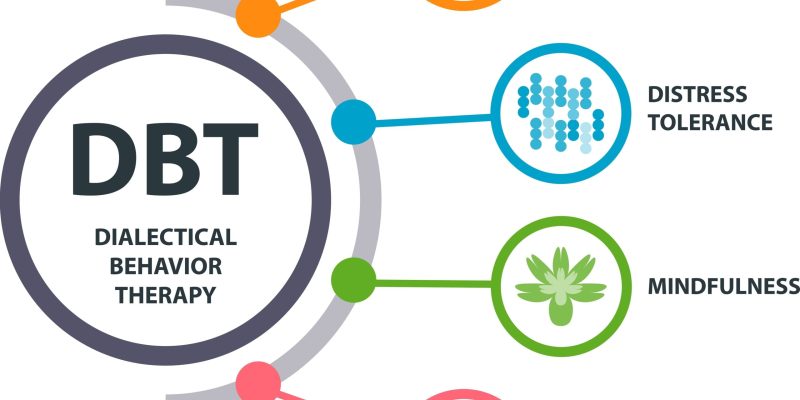Dialectical Behavior Therapy (DBT) has gained recognition as a powerful therapeutic approach for managing emotional dysregulation and complex mental health issues. Developed by Dr. Marsha Linehan, DBT integrates cognitive-behavioral techniques with mindfulness and acceptance strategies, providing a comprehensive framework for treating conditions like borderline personality disorder (BPD), anxiety, depression, and substance use disorders. For professionals training to help people, DBT uk courses offer invaluable skills and knowledge to enhance their effectiveness and support their clients’ well-being. This article explores the significance of dialectical behaviour therapy courses for those entering the mental health field and how they contribute to professional development and client care.
The Importance of DBT Courses for Mental Health Professionals
- Evidence-Based Practice: DBT is grounded in a robust evidence base, demonstrating effectiveness in reducing self-harm, suicidal behaviors, and emotional dysregulation. DBT courses provide trainees with a deep understanding of these evidence-based practices, equipping them with skills to apply in clinical settings. Learning DBT enables professionals to offer proven interventions that improve client outcomes and ensure high-quality care.
- Comprehensive Skill Development: DBT courses cover a broad range of techniques and skills essential for managing complex mental health issues. These include:
- Mindfulness: Techniques to help clients stay present and manage their thoughts and emotions.
- Distress Tolerance: Strategies for enduring emotional pain and stress without resorting to maladaptive behaviors.
- Emotional Regulation: Tools for identifying, understanding, and managing intense emotions.
- Interpersonal Effectiveness: Skills for improving communication, building relationships, and asserting needs.
By mastering these skills, professionals are better prepared to support clients through a variety of challenges and enhance their therapeutic practice.
- Addressing Diverse Client Needs: DBT’s versatility makes it applicable to a wide range of mental health conditions beyond borderline personality disorder. DBT courses train professionals to adapt the therapy for different issues such as anxiety, depression, eating disorders, and substance use disorders. This adaptability ensures that clinicians can provide tailored interventions that address the unique needs of their clients.
- Enhancing Therapeutic Competence: For trainees, DBT courses offer a structured approach to learning that enhances therapeutic competence. The courses provide comprehensive instruction in DBT principles, techniques, and applications, helping professionals develop the skills needed to handle complex cases and build effective therapeutic relationships. This training is crucial for developing confidence and proficiency in delivering DBT.
Components of DBT Courses
- Didactic Instruction: DBT courses typically include lectures and readings that provide foundational knowledge of DBT principles, theories, and techniques. This didactic instruction covers the theoretical underpinnings of DBT, its development, and its application to various mental health conditions.
- Practical Skills Training: Courses offer hands-on training in DBT techniques through role-playing exercises, simulations, and interactive activities. This practical component allows trainees to practice and refine their skills, ensuring they can effectively implement DBT techniques with clients.
- Supervision and Feedback: Many DBT courses include supervision and feedback sessions where trainees can discuss cases, receive guidance from experienced practitioners, and address any challenges they may face. This aspect of training helps ensure that trainees are adhering to DBT principles and provides opportunities for professional growth.
- Consultation and Peer Support: Participation in consultation teams and peer support groups is often a component of DBT training. These groups offer a platform for sharing insights, discussing complex cases, and receiving support from colleagues. This collaborative approach fosters a deeper understanding of DBT and enhances the learning experience.
- Certification and Continuing Education: Upon completing DBT courses, trainees may have the opportunity to obtain certification or participate in continuing education. Certification provides formal recognition of their expertise in DBT, while ongoing education ensures that they stay updated on the latest developments and best practices in the field.
Relevance of DBT Courses to Professional Training
- Comprehensive Training for Emerging Professionals: DBT courses provide emerging mental health professionals with a comprehensive toolkit for managing complex client issues. The skills and knowledge gained through DBT training are applicable across various settings, including private practice, hospitals, and community mental health organizations.
- Enhanced Client Outcomes: Professionals trained in DBT are better equipped to support clients in managing emotional dysregulation and improving overall functioning. The evidence-based nature of DBT ensures that clients receive effective interventions that contribute to their recovery and well-being.
- Increased Professional Confidence: DBT courses build professionals’ confidence in their ability to handle challenging cases and provide effective treatment. This confidence is crucial for delivering high-quality care and establishing strong therapeutic relationships with clients.
- Career Advancement: Proficiency in DBT can enhance career opportunities for mental health professionals. Organizations value clinicians with specialized training in evidence-based therapies, and DBT expertise can lead to advanced roles, increased job satisfaction, and professional recognition.
Conclusion
Dialectical Behavior Therapy (DBT) courses are a vital component of professional training for mental health practitioners. These courses provide a comprehensive understanding of DBT’s evidence-based techniques and skills, enabling professionals to effectively support clients with complex emotional and behavioral challenges. By mastering DBT, trainees enhance their therapeutic competence, improve client outcomes, and advance their careers in the mental health field. As DBT continues to evolve and address a broad range of mental health issues, its relevance in professional training underscores the importance of ongoing learning and skill development in providing effective and compassionate client care.







Comments